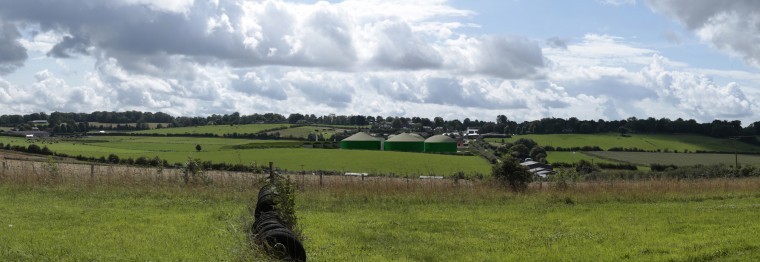The plans have already caused controversy, with college principal Tim Jackson objecting to South East Farmer’s coverage of the first application.
This time, renewable energy business Ecotricity is hoping its revised application for the plant will overcome the council planning committee’s concerns, especially about traffic to and from the plant. But Hampshire farmer Douglas Paterson – who spoke in objection when the committee discussed the plans – thinks the plant still faces big hurdles.
He argues that bringing material in to feed the plant by tractor and trailer means there will be at least 50% more traffic movements because of the size of the load they can take. “I can almost guarantee it will not be done by tractor and trailer – I would almost put money on this coming in by lorry.”
Ecotricity has said that the feedstock for the plant will be grass from marginal land within a 15 mile radius of Sparsholt. “That is completely wrong, because you do not get high energy producing feedstock from odd strips of conservation or marginal land,” Mr Paterson said. “Either they do not know what they are doing or they are being extremely economical with the truth.”
The current plans are “totally” out of scale for the site, Mr Paterson said. “I would understand it if they were doing a farm scale AD plant suitable for a holding of that size. But running the massive plant they are talking about on a farm of a limited size in a rural area with narrow lanes is asking for trouble.”
Taking the feedstock from within a 15 mile radius of the college is “a very tall order,” Mr Paterson added. “I’m not saying they won’t get some of it. But the farming community is very skeptical because this could distort the local market for forage.”
Ecotricity said the council refused the initial application to build the £10 million plant and renewable energy training centre on the college’s 400 acre campus because of concerns over the “type and volume of traffic” proposed on the local roads and insufficient “detail of the routes” to be used, which posed some safety issues.
The revised application includes:
- more detailed information on the type of tractors and trailers to be used, and – after additional traffic surveys – clear restrictions on the timing of deliveries and in some cases a new cap on the number of vehicles;
- revised traffic route plans with specific restrictions on roads through villages such as Sparsholt, Littleton, Crawley and Up Somborne which have been marked as red routes for through traffic;
- strong penalties on drivers using wrong routes, including termination of contracts for repeat offenders.
Stuart Brennan, Ecotricity’s spokesman, said feedstock supply and digestate removal movements will be continuously monitored through GPS tracking. “This would be supplemented at the AD plant itself by vehicles being booked in and out.
“We will retain data on vehicles movements in order to demonstrate that suppliers are meeting the requirements of the traffic management plan if challenged.”
Mr Jackson said: “I have been involved in some very constructive meetings with representatives of local parish councils to outline the traffic movements specifically.
“While there has never been any intention to use their lanes as through routes, we’ve nonetheless introduced specific restrictions on roads through the villages to provide reassurance to the local community.
“We’ve introduced more detail on why tractors are appropriate on rural roads where they are already common and carried out extra traffic surveys to show how the very low increase in traffic volumes – just three per cent at its absolute peak near the final destination – dissipate further across the road network.”
All the restrictions will be included in an operational management plan, parts of which will be controlled by conditions on any planning permission and a legal agreement, Mr Jackson added.
Up to eight specialist professional jobs will be created to run the plant, while the new supply contracts with farmers providing the grass and rye feedstock will reinforce existing jobs. In line with other renewable energy projects, a community benefit fund of £5,000 a year would be available.
Pictured: Ecotricity’s impression of what the Sparsholt plant could look like




